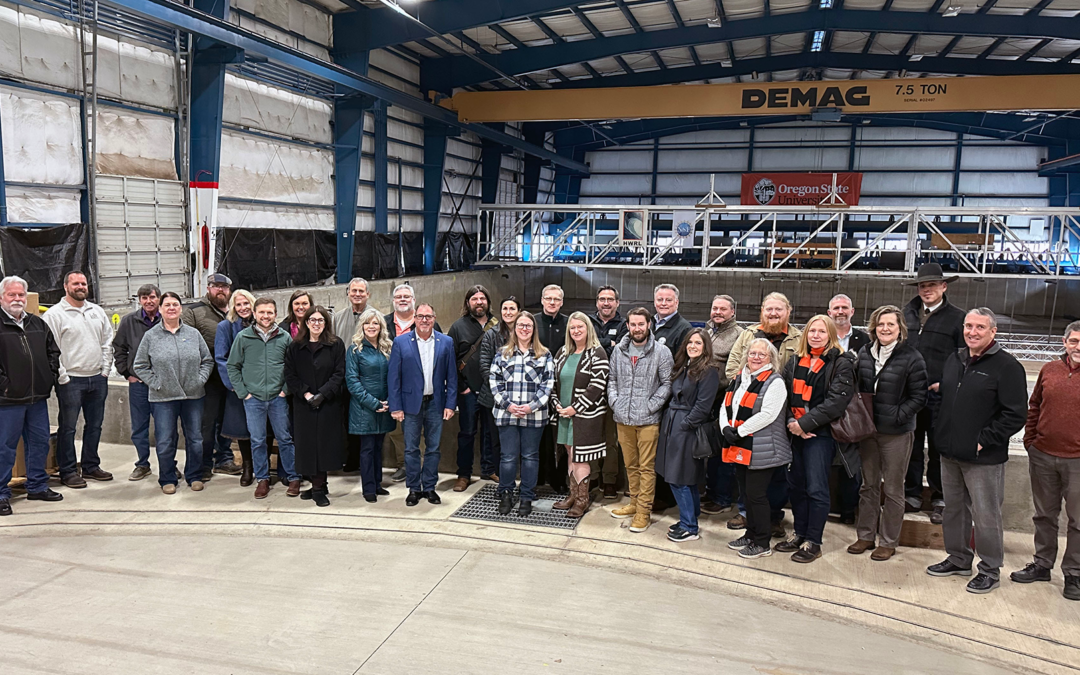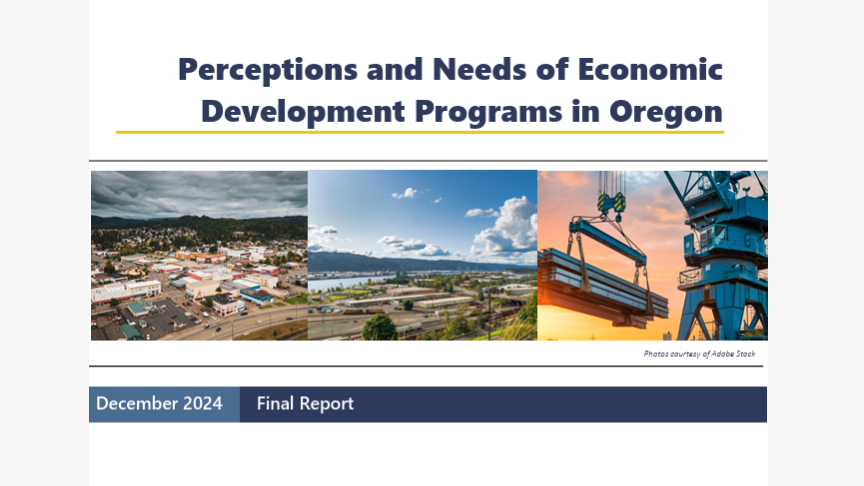
Jan 30, 2025 | AOC News
New county commissioners, judges, chairs, and staff from across Oregon came together in January for the launch of a new class of County College. This biennial program, established in 2006 by the Association of Oregon Counties (AOC) in partnership with the Oregon State University Extension Service, provides a platform for new members to connect and gain important insights into county government.
The 2025 cohort includes new AOC members from 20 different counties, along with staff from OSU Extension Services, which hosted the first session.
With class sizes averaging between 20 and 30 participants, one of the program’s greatest strengths is the opportunity to network and build relationships with colleagues from across the state. “AOC is proud to continue offering this essential service to our members,” commented AOC Executive Director Gina Nikkel. “This program is truly unique, and the connections formed during class will provide members with invaluable support well into the future.”
The program offers sessions led by professionals in core county service areas, including community and economic development, finance, human services, infrastructure and public works, public safety, leadership, and management.
This first session offered valuable information on county government, public meetings law, and the legislative process. Attendees heard presentations from the Oregon Government Ethics Commission and Benton County. In addition, OSU Extension Services Interim Director Dr. Kris Elliot and directors from all their programming highlighted their many services.
“Session 1 of AOC County College was an amazing kickoff to building important relationships with other leaders from around our great state and offered a strong foundation of partners and resources available from OSU Extension Services,” commented Wallowa County Commissioner Lisa Collier. “ AOC County College is a safe and well-designed space for learning about my new role. I can’t wait for session 2!”
For more information on County College visit: https://oregoncounties.org/ed-events/#countycollege
Contributed by: Erin Good | Communications Coordinator

Jan 27, 2025 | AOC Advocacy
The 83rd Oregon Legislative Assembly convened on Tuesday, Jan. 21, to begin the 160-day session. The Association of Oregon Counties (AOC) Legislative Affairs Department had a productive first week in the Capitol meeting with legislators, attending hearings, and networking with our colleagues. We are already well on our way to achieving our team’s goal of meeting with all 90 legislators in the first 30 days of session to introduce the AOC team and our 2025 policy priorities.
AOC members are encouraged to engage in AOC’s policy process this session – our advocacy is strongest when it is informed by our counties across the state. If you’re not already receiving steering committee meeting notices and agendas, you can sign up through the 2025 AOC Committee Interest Form. AOC steering committee meetings are a critical forum for our members to learn about and weigh in on legislative concepts impacting county services, budgets, and governance.
The AOC Legislative Committee meets in Salem at the AOC office on the second Monday of every month – “AOC Day” – to consider steering committee recommendations. AOC steering committees meet on a rotating schedule the preceding Friday (virtual only) and Monday (hybrid). The most up-to-date information can be found on the calendar on AOC’s website, and calendar invitations are sent out monthly.
Members can also expect emailed communications from AOC’s Legislative Affairs Department with timely legislative updates, information about action taken by the AOC Legislative Committee, and issue-specific action alerts urging our members to contact legislators or submit testimony on high priority bills.
The AOC Legislative Committee adopted the below 2025 Policy Priorities based on steering committee recommendations in June 2024. These priorities, along with positions and principles recommended throughout the legislative session by AOC steering committees, guide the advocacy work of the AOC Legislative Affairs Department.
AOC 2025 POLICY PRIORITIES
Assessment and Taxation Funding
- Sustain and protect the property tax asset to the benefit of all property owners and taxing districts through adequate, equitable, and stable funding for county assessment and taxation programs.
Contact: Legislative Affairs Manager Justin Low, Governance, Revenue, and Economic Development
Health and Human Services
- Provide counties with the resources to address Oregon’s addiction and homelessness crises by removing administrative burdens and funding county public health and behavioral health services, deflection programs, and local homelessness response coordination for youth and adults.
Contact: Legislative Affairs Manager Jessica Pratt, Health and Human Services
Natural Resources
- Protect and strengthen county authority, funding, and flexibility in managing local natural resource policies.
Contact: Legislative Affairs Manager Branden Pursinger, Natural Resources and Land Use
Community Corrections
- Fully fund a revised community corrections formula that accurately reflects the costs incurred by counties.
Contact: Legislative Affairs Manager Tim Dooley, Public Safety, Broadband, and Solid Waste
Transportation Funding
- Ensure a comprehensive transportation funding package prioritizes investments in operations, maintenance, and safety; incorporates diverse and modern funding mechanisms to ensure the growth and stabilization of the State Highway Fund (SHF); maintains the 30% county share of SHF revenues; and reduces barriers to local revenue sources.
Contact: Legislative Affairs Director Mallorie Roberts, Transportation
Contributed by: Mallorie Roberts | Legislative Affairs Director

Jan 27, 2025 | AOC News
The Association of Oregon Counties (AOC) has hired Justin Low as a legislative affairs manager, covering issues related to governance, revenue, and economic development.
Low brings considerable experience in legislative affairs to AOC, having previously served as a staffer in the Capitol and as the Associate Director of Policy and Research at the Oregon Justice Resource Center. In these roles, he was responsible for analyzing legislation, conducting fiscal reviews, and effectively communicating policy positions to a wide range of stakeholders.
“Justin’s expertise in policy research, ORS and OAR proficiency, and understanding of the legislative fiscal process will be invaluable assets to our team,” said Gina Nikkel, AOC executive director.
Contributed by: Erin Good | Communications Coordinator

Jan 27, 2025 | AOC Business Partner
Sponsored content contributed by AOC Business Partner: University of Oregon
IPRE’s UO Economic Development Administration University Center is pleased to present our latest Perceptions and Needs of Economic Development Programs in Oregon report. This is the third statewide assessment we’ve completed since 2012. The intent is to help inform economic development practitioners and decision makers on needs related to economic development in Oregon. This report was partially funded through our the Economic Development Administration University Center grant.
Key takeaways from the report include:
- Most respondents indicate that they have economic development goals, strategies, or policies that go beyond the requirements of Oregon Statewide Planning Goal 9.
- Economic development is perceived as important, but many communities do not achieve the outcomes identified in their plans.
- Survey respondents agreed that coordination is essential, not easy, worth the effort, and often ineffective.
- Respondents perceived similar assets and barriers to the 2012 and 2017 Economic Development Needs Assessment.
- Respondents indicated familiarity and understanding of economic resiliency concepts, but do not think communities adequately plan for it.
- Respondent’s greatest identified needs include funding, stronger leadership, a better trained and maintained workforce, technical assistance, and better coordination.
You can download the report using the link below:
Economic Development Needs 2024 Final (PDF)

Jan 27, 2025 | AOC Business Partner
(Pictured above: An employee drives the research planter to the wheat research plots before sunrise at the OSU Columbia Basin Agricultural Research Center near Pendleton. Credited to Lynn Ketchum, OSU)
Sponsored content contributed by AOC Business Partner: OSU Extension Services
Farmers and ranchers face overwhelming stress from market fluctuations, crop failures, unpredictable weather, injuries and other setbacks, leading to depression and, too often, suicide. According to the Centers for Disease Control and Prevention, male loggers and commercial fishers’ risk of suicide are among the highest among all occupations: nearly five times the rate of the general male population — 114 and 112 per 100,000, respectively.
Male farmers die by suicide at twice the rate of the general population, with 48 per 100,000 people. This alarming trend has been rising in recent years, particularly among rural men over 49, who are considered a high-risk group. Suicide data by occupation reveal that loggers, commercial fishers, farmers and ranchers are among those with the highest risk.
To address this crisis, the AgriStress Helpline launched in Oregon in September 2023. Available 24/7 by call or text at 833-897-2474, the helpline is staffed by certified suicide preventionists with additional training in issues specific to Oregon’s agriculture and natural resource communities. The Oregon Legislature passed Senate Bill 955 in 2023, providing a one-time general fund appropriation to establish an endowment for Oregon State University Extension Service to implement and operate the helpline in its first year. A coalition of 27 agriculture, timber, and health care organizations advocated for the passage of SB 955.
Allison Myers, associate dean in OSU’s College of Health, and Todd Nash, a Wallowa County rancher and past president of the Oregon Cattlemen’s Association, were instrumental in building support for the helpline. Oregon is the first state to operate the AgriStress Helpline in partnership with an Extension service.
As of September 2024, the helpline had provided support and referrals, including crisis interventions, for callers from 21 counties. While call details remain confidential, available data show that the helpline is effectively reaching its intended audience, with callers expressing a preference for a service tailored specifically to their needs.
This helpline is one of several OSU Extension programs and initiatives collaborating with farmers, families and communities to implement evidence-based strategies that promote mental health and reduce substance use in rural Oregon.
The Farm and Ranch Stress Assistance Network — an OSU Extension program that launched in 2021 — uses QPR (Question, Persuade, Refer) to teach farmers, ranchers, and their family and friends how to recognize signs of a mental health emergency and interrupt the process that leads to suicide.
The network website includes a list of the signs and symptoms of stress and suicide, such as withdrawal from others, giving away precious possessions, depression, drug or alcohol abuse, or decline in the care of livestock, farmstead appearance and personal care.
To train people to be a positive force, OSU Extension offers QPR trainings, many of which are on Zoom. Participants learn to recognize the signs of suicide and question someone in crisis, persuade them to seek help, and refer them to a hospital, counselor, or other resources to get the help they need.
OSU Extension through QPR has trained more than 450 people in how to recognize signs of distress and intervene in mental health emergencies. In post-course surveys, 67% of participants indicated an increase in knowledge of warning signs of suicide, and 83% reported an increased understanding of suicide prevention facts, risk factors, and how to ask someone about suicide.
Additionally, 67% reported an increased understanding of how to persuade someone to get help, and 83% said they would likely ask someone about suicide if they saw warning signs and were concerned.
OSU is part of four regional Farm and Ranch Stress Assistance Network entities across the United States funded by the U.S. Department of Agriculture National Institute of Food and Agriculture.
The Coast to Forest collaboration between the OSU Extension Family and Community Health Program and the OSU Center for Health Innovation works on mental health promotion and substance use prevention.
Coast to Forest goals include:
- Improving mental health and well-being
- Expanding training tools and technical assistance through the OSU Extension Service and the OSU College of Health
- Building capacity in rural Oregon to prevent and reduce opioid and stimulant use disorders and their consequences and move people to recovery
The Coast to Forest initiative builds upon existing state and community strengths and resources. This includes a growing network of community health workers, radio stations covering communities’ health and wellness, community level partnerships and an expanding Mental Health First Aid network.
OSU Extension is committed to enhancing mental health support for rural communities, addressing the unique stressors faced by farmers, ranchers and natural resource workers. Through initiatives like the AgriStress Helpline and training programs, OSU Extension provides critical resources to prevent suicide, promote mental well-being and reduce substance use.
Story sources: Allison Myers, Julie Leep, Cassie Bouska — Oregon State University Extension Service
Read this article online: https://beav.es/Gux





